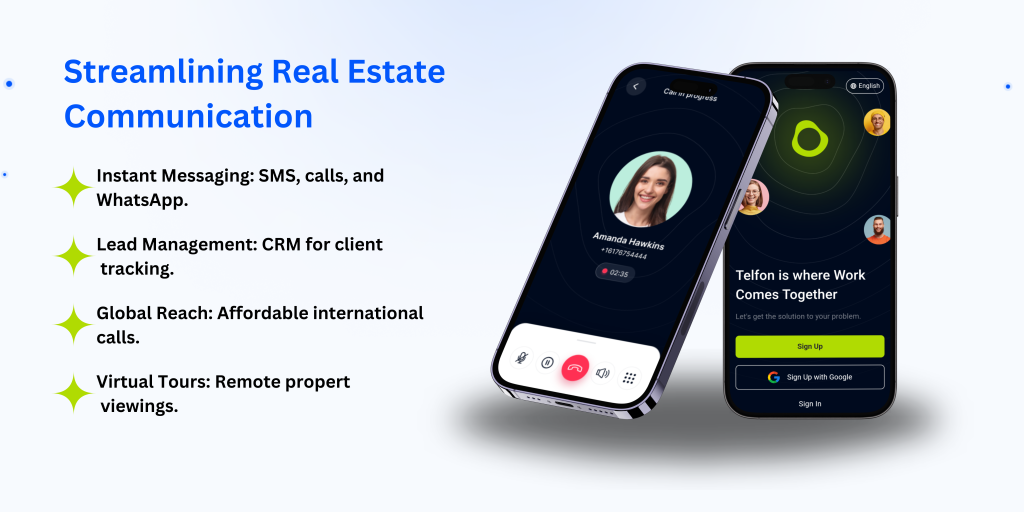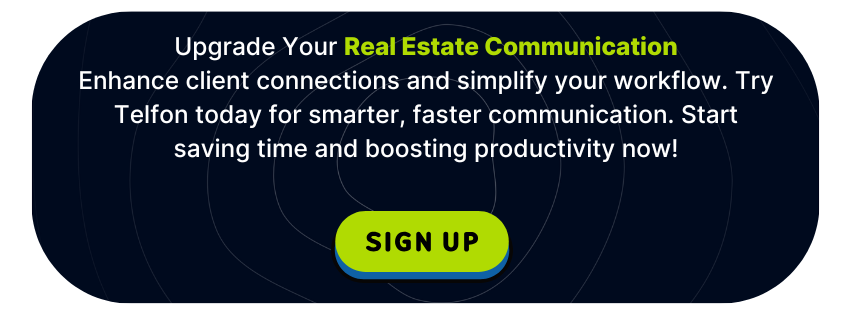
Effective communication has always been vital in real estate. How professionals connect is changing rapidly. Technology is driving this transformation significantly. This shift includes virtual property tours. It involves advanced CRM systems too. Cloud-based communication tools are key now. Today’s real estate businesses have many resources. These tools improve efficiency greatly. They strengthen client relationships effectively. Sales opportunities also increase with better tools.
Relying only on traditional methods is less common. Phone calls or face-to-face meetings were standard. Now, technology plays a crucial role. It streamlines communication processes. This drives business success in real estate. Let’s explore how these changes revolutionize the industry. We will see how businesses can stay competitive. You can also find useful resources on the impact of technology in real estate communication.
The Core Need: Effective Communication in Real Estate
Effective communication is essential everywhere. In real estate, it makes a huge difference. Maintaining clear contact builds trust quickly. It increases client satisfaction consistently. This often leads to more deals closing. The industry relies on human interaction heavily. Agents show properties to buyers. Brokers negotiate terms carefully. Property managers handle maintenance needs.
The market is increasingly competitive now. Professionals need communication to be frequent. It must also be very efficient. Client relationships often decide outcomes. They determine securing long-term deals. They can also mean losing a sale entirely. Your ability to connect matters. Digital interactions are now standard. Over 90% of transactions use them. Platforms, virtual meetings, and messaging are common. They speed up connections greatly. Professionals connect with clients faster now. Interaction is easier from anywhere, anytime.
Overcoming Communication Challenges in Real Estate
Real estate professionals face specific hurdles. Handling communication presents difficulties. Understanding these challenges is the first step. It helps in adopting the right technology. Managing interactions effectively is crucial for growth.
Here are some key challenges:
- Managing Multiple Clients and Leads: Professionals juggle many clients daily. They are at different buying or selling stages. Tracking each client’s unique needs is hard. Their preferences and timelines also vary. This can feel overwhelming quickly. Without organized systems, details get missed. This causes delays in processes. It also leads to lost opportunities sometimes.
- Staying Connected in a Mobile World: Clients expect very fast responses now. Real estate often involves time-sensitive decisions. Many agents are constantly on the move. They show properties often. They meet clients frequently. Attending open houses takes time too. It becomes difficult to check messages. Responding to calls from potential clients is challenging.
- Coordination Between Teams: Agents rarely work alone completely. They collaborate with different teams. Marketing and admin support are vital. External partners are also involved. Mortgage brokers are common examples. Clear communication among all parties is critical. It ensures all aspects of a deal proceed smoothly. Proper management requires coordinated effort.
How Technology Reshapes Real Estate Communication
Technology has fundamentally changed real estate. It provides powerful tools for connection. These tools address traditional communication gaps. They improve efficiency and client service quality. Embracing these advancements is vital for success.
Here are ways technology is revolutionizing communication:
- Virtual Property Showings and Meetings: Virtual tours are a major change. Remote communication tools are widely adopted. Platforms like Zoom are now common. Agents conduct virtual property viewings easily. Clients see homes without physical visits. This greatly helps remote clients. Those in different cities or countries benefit. Virtual tours save everyone time. They expand the potential market range. In-person meetings are less needed. The buying process feels more flexible.
- Customer Relationship Management (CRM) Systems: CRM systems are central to success. They organize leads and client data. Sales information is also managed here. All communication history is stored centrally. Track emails, phone calls, and meetings. Note important details easily. Get a complete overview of each client. CRMs streamline communication flow. They automate follow-ups efficiently. Managing the sales pipeline improves significantly. This boosts overall productivity. No valuable lead is overlooked.
- Instant Messaging and Texting: Today’s clients want faster responses. Traditional phone calls might not meet expectations. Messaging services help agents stay in contact. Use SMS, WhatsApp, or app-based chats. Agents give quick updates easily now. They answer client questions in real-time. A large percentage of buyers prefer text. It is faster for quick communication needs. Agents using messaging see better client engagement. Responses are often much quicker.
- Communication Automation Tools: Automation is a key advancement now. Automate follow-up emails effectively. Send appointment reminders automatically. Property updates can be automated too. Stay connected without constant manual effort. Use automated campaigns for property lists. Send listings based on client preferences easily. Systems can schedule calls for you. They send meeting alerts automatically. This reduces manual workload significantly. It ensures communication is consistent always.
Elevating Connectivity with a Modern Virtual Phone System
A virtual phone system offers significant advantages. It helps professionals connect better. These are also known as cloud phone systems. Or modern business phone systems. They provide flexible, powerful tools.
Consider using a virtual phone system like Telfon. It can greatly enhance how you connect. Manage sales talks effectively. Improve lead management processes. Streamline client follow-ups easily. Telfon’s features make communication simpler. It is faster and often more affordable.
Here is how a tool like Telfon helps real estate pros:
- Managing Diverse Client Needs: Use different virtual numbers if needed. This helps manage multiple clients efficiently. It ensures each client gets focused attention. A dedicated virtual number offers flexibility. Easily separate your business and personal calls. Maintain professionalism effortlessly.
- Streamlining International Outreach: Many real estate agents work globally. They interact with overseas buyers or sellers. Virtual systems offer affordable international plans. Maintain clear communication worldwide easily. Connect with clients regardless of location.
- Enabling Real-time Messaging: Support for SMS and WhatsApp is common. Stay in instant touch with clients. This is possible even when away from your office. Respond promptly to urgent client questions. It facilitates quick information exchange.
- Centralized Communication Management: Many virtual systems integrate tools. Call forwarding routes calls smartly. Voicemail captures missed messages reliably. Text messaging keeps conversations recorded. User-friendly dashboards help track interactions. This provides insights into communication trends.

Best Practices for Effective Real Estate Communication
Adopting technology is important. How you use it matters even more. Implementing smart communication practices maximizes results. Focus on building strong client relationships always. Be responsive and available for your clients.
Here are some best practices to follow:
- Be Accessible on Multiple Channels: Clients expect options for contact. Ensure you are reachable via phone. Be available on email and text messages too. Make your business number easy to find. Respond promptly across all platforms used. Consistency across channels builds trust.
- Foster Strong Client Relationships: Personalized communication makes a difference. Take time to understand client needs fully. Provide solutions tailored specifically for them. Use CRM systems to track preferences. Offer service that feels personal and attentive. Building rapport is crucial.
- Utilize Video for Immersive Experiences: Video conferencing is very effective. Use it beyond simple meetings. It is powerful for property showings virtually. Platforms like Zoom work well. Conduct virtual tours for clients. Answer questions immediately during the tour. This offers convenience and flexibility.
- Prioritize Quick and Consistent Responses: Set realistic expectations for response times. Clients appreciate timely updates greatly. Use your communication tools wisely. Ensure prompt replies to all inquiries. Consistency in communication is key. It reinforces your professionalism.and improving conversion rates.
The Horizon: Future Trends in Real Estate Communication
Technology continues its rapid evolution. The future of communication looks exciting. New advancements will further enhance connectivity. Real estate professionals will have more sophisticated tools. Stay updated on these trends.
Future trends likely include:
- AI-Powered Assistance: Expect more artificial intelligence tools. Chatbots will handle initial client queries fast. AI might help qualify leads automatically. Voice assistants could provide instant information. They will free up agent time significantly.
- Immersive Viewing Technologies: Virtual Reality (VR) is set to grow. Augmented Reality (AR) will also play a role. They will change property showcase methods. Incorporate these into your strategy soon. Offer clients highly immersive experiences. They can explore properties remotely and vividly.
- Advanced Data Analytics: Leverage data from communication tools. Gain deeper insights into client behaviors. Understand communication patterns better. Personalize services based on this data. Make more informed decisions moving forward. This drives better outcomes.
Embracing the Communication Revolution
The real estate industry is transforming quickly. Communication methods are changing profoundly. This is driven by powerful technology tools. Professionals adopting new tools gain an edge. Virtual phone systems are becoming essential. CRM platforms remain vital for organization. Communication apps streamline daily tasks.
These tools help build stronger relationships. They streamline operational processes. They lead to closing more deals successfully. A robust tool like Telfon can revolutionize your approach. Its advanced features support modern needs. Virtual numbers offer flexibility. International calling connects globally. Seamless messaging improves responsiveness. Integrate Telfon into your strategy today. Enhance client engagemecommunication strategy, you can offer clients an immersive experience, allowing them to explore properties without stepping foot inside.Enhance client engagement consistently. Provide quicker, reliable responses. Maintain a polished professional presence. Take your real estate business higher with better communication tools.

Frequently Asked Questions (FAQs)
Q1. Why is good communication vital in real estate?
Good communication builds client trust quickly. It improves client satisfaction significantly. This helps secure more deals successfully. Clear and fast interaction differentiates professionals. Strong relationships based on good talks drive business success.
Q2. What technology helps real estate communication?
Key tools include CRM systems for data. Virtual tour platforms are important for viewing. Instant messaging apps are essential for speed. Automated communication helps manage tasks. Virtual phone systems offer professional flexibility. These streamline client interactions effectively.
Q3. How can tech help manage multiple clients?
CRM systems organize client data efficiently. They track interactions easily over time. Automation handles routine follow-ups automatically. Virtual phone systems help manage varied calls. They can provide separate numbers for different needs. This keeps client details well-organized.
Q4. What are the benefits of a virtual phone system?
Virtual systems provide a professional business number. They offer flexible calling features needed today. International calls are often more affordable. Features like voicemail are included automatically. They support text messaging integration easily. This helps centralize communication records.
Q5. Is using text messaging effective for clients?
Yes, texting is very effective now. Clients expect faster responses in real estate. Many prefer quick updates via text messages. It allows instant interaction for simple needs. Use it for brief questions or confirmations. It generally boosts client engagement rates well.









